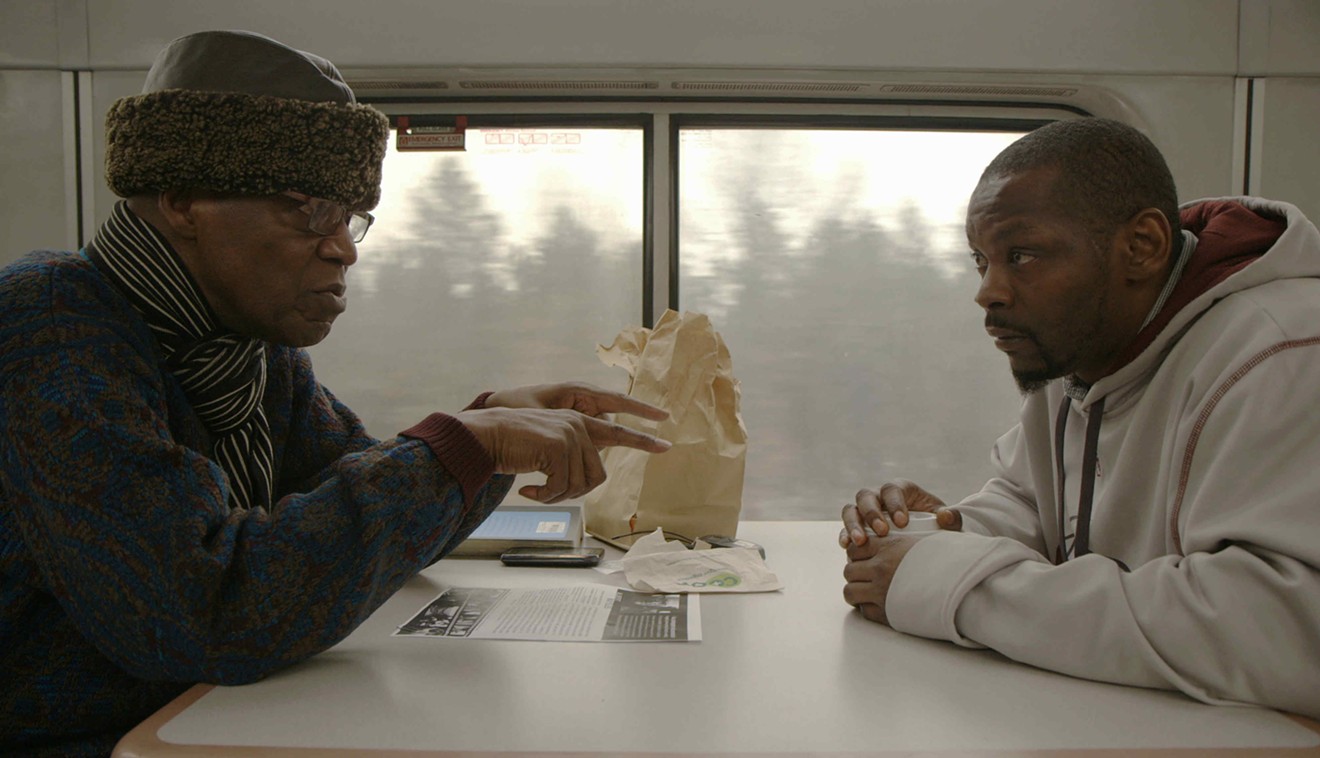A white man sits in an observation car and marvels at the hilled vastness of a Dakota. He says he prizes “the therapeutic value of the plains” and that in hard times — like now, as his relationship with his partner seems to be fraying — he returns to that great American middle to clear his head and remember where he’s from. We cut from that to a young black woman, pregnant and four days past her due date, surveying a flat stretch of country between Chicago and Minneapolis. “I don’t see how people can live out here,” she says, and laughs. “What’s there to do — count cows and sheep?”
She’s speaking to another white man, older, camera-wielding, from the East Coast. He snaps photo after photo of the hills and flats and the snow-peaked Rockies, but also of that young mother-to-be, with whom he becomes immediately close. We later learn that he’s taken this cross-country trip as a “last train ride.” The impetus: “Maybe I don’t want to die without having a good look at the world.” Their easy friendship — both are worried she might go into labor; both talk frankly about family and their pasts — is just one of this slight, sweet film’s many beauties.
The transporting In Transit, like the journeys it documents, on Amtrak’s Empire Builder Chicago-to-Seattle line, is all about connections, about people moving on to new lives or going back home to old ones, about what happens when American strangers have so much time to kill that they can’t avoid talking to each other. The film (directed by the late Albert Maysles and collaborators from the Maysles Documentary Center) opens with two young wanderers taking turns detailing their ramblin’-life philosophies: “You know what’s scary? Staying where you are!” The filmmakers catch travelers chatting with each other, the conversations often profound. A mother and her adult daughter tell each other what they wish for each other, and the mother is surprised at what she hears: “Your dream for me is that I’m social?”
“Socialize, mother!” the daughter pleads. Their words, their faces, like the wind and the sea-sculpted plains, reveal a long history. The daughter has moved out on her own, starting a life, and it tears her up that the mother is home alone. Soon, they silence and hold hands.
Hand-holding also figures in an intense, passionate discussion between two African-American men, one a youngish grown-up and the other what he calls an “elder,” an inspiring fellow who marched with Martin Luther King. The younger man speaks about having grown up without a mother or a father — “the denial of love that I had” — and the older tells him that the best we can do, the route to healing, is to do just what they’re doing now: to talk to each other and to help each other. They cry, too.
Somehow there are no tears from the older white woman who speaks straight into the camera about having just seen her daughter for the first time in 47 years, not even when she tells us that she gave that daughter up all those years ago to spare her a life with an abusive father.
For all that big emotion, the film is also fleet and light, interested in everyday train problems — of course a little boy loses his shoes — and the state of life on the plains. The oil boom has remade Dakota life, and we meet many young men working in that business, usually far away from family or lovers. One lays out his plan to work seven hard years and then be “set for life,” a phrase none of the older people would use. They know that all of us are forever in a process of becoming, and that time out from your current everyday — time in transit — can be a gift, whether you’re barrelling toward a fixed destination or not. One woman says, heartbreakingly, “I’m transitioning in my marriage,” and she would prefer not to leave the train at all. Once she’s off these rails, she has to make some hard choices.
Of course, clearing your head on Amtrak is a privilege, as the ride’s funniest passenger reminds us. Not long after we see a dining-car sing-along and much spirited card-playing, a black man in his 20s cheerily lampoons the talk of the free-spirited white woman sitting near him. “When you’re able to be at a crossroads, your parents are freaking loaded!” he says with a laugh. “If you’re at a crossroads, why are you going snowboarding? What you’re doing is going on vacation!”
The film is gently thrilling, often revealing, alive with talk and scenic beauty and well-observed vignettes. It was shot in 2013 and ’14, so nobody mentions Trump. It’s 76 minutes of Americans at the best and kindest. It’s a vacation.
[
{
"name": "Air - MediumRectangle - Inline Content - Mobile Display Size",
"component": "18855504",
"insertPoint": "2",
"requiredCountToDisplay": "2"
},{
"name": "Editor Picks",
"component": "17105533",
"insertPoint": "4",
"requiredCountToDisplay": "1"
},{
"name": "Inline Links",
"component": "18349797",
"insertPoint": "8th",
"startingPoint": 8,
"requiredCountToDisplay": "7",
"maxInsertions": 25
},{
"name": "Air - MediumRectangle - Combo - Inline Content",
"component": "17105532",
"insertPoint": "8th",
"startingPoint": 8,
"requiredCountToDisplay": "7",
"maxInsertions": 25
},{
"name": "Inline Links",
"component": "18349797",
"insertPoint": "8th",
"startingPoint": 12,
"requiredCountToDisplay": "11",
"maxInsertions": 25
},{
"name": "Air - Leaderboard Tower - Combo - Inline Content",
"component": "17105535",
"insertPoint": "8th",
"startingPoint": 12,
"requiredCountToDisplay": "11",
"maxInsertions": 25
}
]












